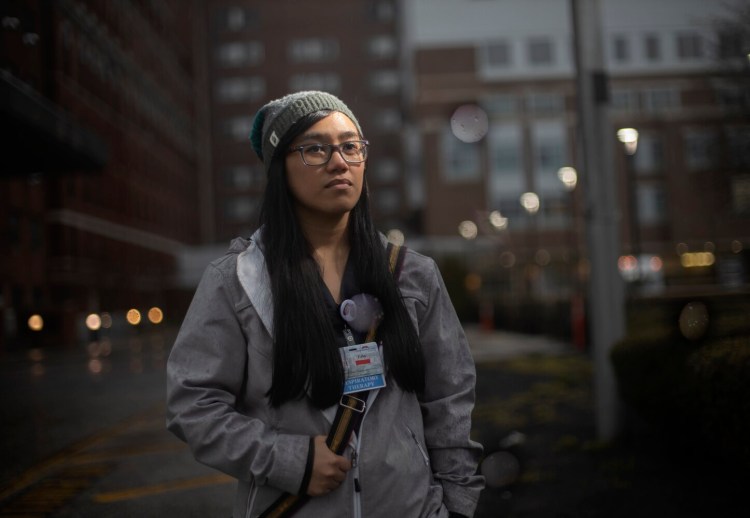Maine hospitals are scrambling to find enough respiratory therapists to run the ventilators they already have to treat the worst COVID-19 cases, much less the 300 to 400 additional ventilators that the state is seeking.
That is why the state is asking retirees, respiratory therapists who work outside the hospital and student trainees to step forward and help shoulder the workload, freeing up hospital-based therapists to manage ventilated patients inside intensive care units.
Erin Ganga, a 27-year-old Portland resident in her final weeks of the respiratory therapy program at Southern Maine Community College, is treating patients with asthma and pneumonia at Maine Medical Center so hospital therapists can focus their attention on COVID-19 patients in intensive care.
“People still need their nebulizers and breathing treatments, and we’re still doing those because you still have sick patients coming to the hospital, but we can’t leave ventilated patients untended, either,” Ganga said. “With me there, hospital RTs can stay in the ICU, where they are needed most.”
A respiratory therapist on ventilator duty helps insert a breathing tube into patients who can’t breathe on their own and uses a patient’s weight and blood oxygen levels to calculate how much air is needed, and at what force, to inflate their lungs, said Kathy Roy-Gosselin, head of the Maine Society for Respiratory Care.
The work does not end with intubation, Roy-Gosselin said. The therapist must monitor the blood oxygen levels through regular blood draws to make sure patients get the oxygen flow needed at that point in their care and administer aerosolized medication through the ventilator, she said.
According to industry guidelines, a respiratory therapist can safely handle six to eight ventilated patients at a time, Roy-Gosselin said. With COVID-19, however, some hospitals are cutting that therapist-to-ventilated patient ratio in half because the infection can progress so quickly.
At Maine Medical Center, two respiratory therapists share management of eight ventilated patients in a COVID-19 intensive care unit, Ganga said. The two-person team makes it easier to roll ventilated patients over often, facilitating oxygen flow throughout the lungs.
As of Friday, Maine hospitals had 324 standard ventilators in their possession and just under 200 alternative ones recently approved for use by the U.S. Food and Drug Administration, according to the Maine Center for Disease Control and Prevention. Maine CDC is requesting another 400 from the Strategic National Stockpile.
At full capacity, Maine hospitals would need at least 64 respiratory therapists to oversee the 520 standard and alternative ventilators they already have, all at one time, using the most generous 8-to-1 staffing ratio recommended by industry guidelines. Using the Maine Medical Center ratio, it would need 128 therapists.
At first glance, Maine hospitals have just enough respiratory therapists, 127, to implement the 4-to-1 ratio that Maine Medical Center is using across the state – until, as Roy-Gosselin points out, those therapists go to sleep, take even one day off or become infected with COVID-19 themselves.
With just sleep in mind, Maine would need twice as many therapists, or 256, to work 12-hour shifts seven days a week to staff all of the ventilators that Maine hospitals already have at the 4-to-1 ratio. The number of therapists needed jumps to 228 or 456, depending on the ratio, if Maine lands 400 more ventilators.
That is why Maine CDC Director Dr. Nirav Shah is asking all licensed respiratory therapists to help out.
“This is something we’ve been thinking a lot about,” Shah said Thursday during his daily COVID-19 media briefing. “It recognizes and acknowledges that it is more than just a physician and ventilator that’s needed. It’s an entire support staff.”
Shah asked respiratory therapists who work outside the hospital setting and those with recently expired licenses to help out area hospitals, especially in rural parts of the state. If that doesn’t work, Maine may consider cross-training other medical professionals and asking out-of-state therapists to help Maine out.
On paper, Maine should have enough respiratory therapists to staff the ventilator needs. Maine has about 800 respiratory therapists and technicians, who have sat for fewer board exams than therapists but could still run a ventilator. But many of those 800 don’t work at hospitals. Some don’t even work in Maine.
According to Roy-Gosselin, many respiratory professionals work in nursing homes, home care or sleep labs. Some of them may pick up a per-diem shift at a local hospital here and there, but aren’t prepared to tackle hospital work, or couldn’t because they have other jobs.
Maine was suffering a respiratory therapist shortage even before COVID-19 put this field in the spotlight, Roy-Gosselin said. It only has two college programs producing graduates, and neither program can enroll more than 20 students in a class.
And graduates like Ganga and Maddie Cole, a fellow SMCC respiratory therapy student working at Maine Medical Center, may soon find themselves unable to keep helping out. Their student trainee licenses that they work under are about to expire. The board exams that would usually send them to work are canceled.
“Many of us are worried we’ll graduate and not be able to work since we won’t be registered or licensed,” Cole said during a break in her shift. “My manager has reached out to Governor Mills to try to solve that problem before we get there.”
Copy the Story LinkComments are not available on this story.
Send questions/comments to the editors.



